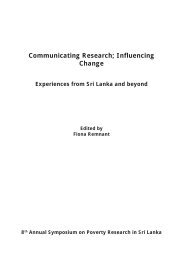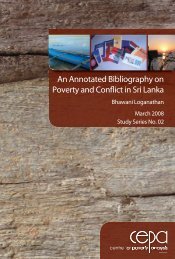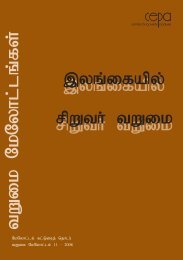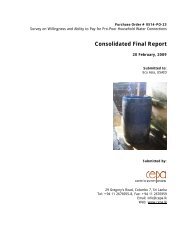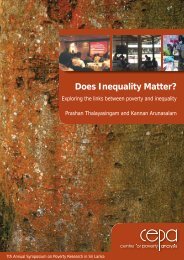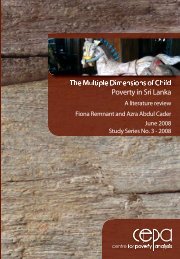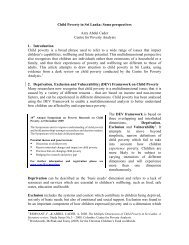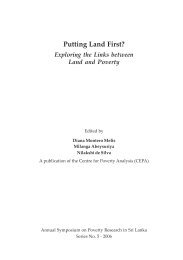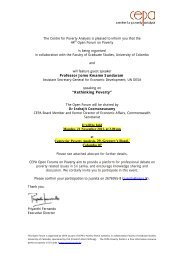Involuntary Displacement and Resettlement â Policy and ... - CEPA
Involuntary Displacement and Resettlement â Policy and ... - CEPA
Involuntary Displacement and Resettlement â Policy and ... - CEPA
- No tags were found...
Create successful ePaper yourself
Turn your PDF publications into a flip-book with our unique Google optimized e-Paper software.
needs were in double digit percentages in Colombo at the end of 2007, therecould be an underlying trend of female heads not being as successful as therest of the population in obtaining compensation. However, without anyreliable baseline data, discrimination cannot be proven definitively. Thereforein the following sections, I discuss how female heads, the elderly <strong>and</strong> othersamong the urban poor have tried to obtain compensation, <strong>and</strong> the responsesto their attempts to claim this entitlement. That analysis below is divided intothe two themes that emerged: access to compensation <strong>and</strong> challenges toself-settlement. Variables used in the analysis include gender, age,household headship <strong>and</strong> pre-tsunami l<strong>and</strong> tenure.Access to Compensation: Getting on the List <strong>and</strong> ThereafterThe inclusion of one’s name on a list written up by the Grama Niladhari (GN)is the ticket out of transitional shelter. Commonly known as the beneficiarylist, this was the official list of the tsunami-affected that relief <strong>and</strong> donoragencies were supposed to work from. If a name does not appear on the list,the person/family is not officially tsunami-affected <strong>and</strong> not entitled to receiveany compensation 12 . Many poor families in Colombo claimed that theirrespective GNs would not put their names on the list for the Rs.250,000 cashgrant, under the assumption that husb<strong>and</strong>s/men in the family would spendthe money on drugs <strong>and</strong> alcohol. Many women who were separated fromtheir husb<strong>and</strong>s at the time of the tsunami were not put on a list, even whenthe house destroyed was registered in her name. The GN put the husb<strong>and</strong>’sname on the list for a new house instead. Many government officialsrecognised neither the rights of women who were separated nor women whowere cohabitating with a partner. Kanthi explains her situation:I divorced my husb<strong>and</strong> 27 years ago, but that was not legally recognised.The house destroyed by the tsunami was in my name. Now I sometimeslive with another man (cohabitating), but I am not legally married to him. Sothe GN says, ‘can’t give a permanent house to you.(Field notes, Kalubowila camp, 16 October 2007)The patriarchal nature of Sri Lankan society (Ruwanpura 2006; Kottegoda2004) <strong>and</strong> its legal framework are embedded within the Tsunami Housing<strong>Policy</strong> as well. The policy only refers to ‘married couples’ (COHRE, 2006). Thebasic unit of Sri Lankan society under the Sri Lankan constitution is the12As bribing one’s way onto a list <strong>and</strong> other forms of corruption were exposed in connectionwith their construction, many donor agencies stopped using them.186



